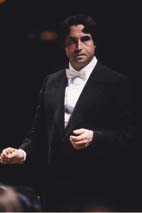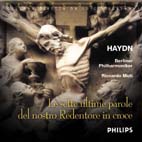| CLASSICAL HAYDN AND CHRIST'S SEVEN LAST WORDS ON THE CROSS CLASSICAL MUSIC Muti and the Music of Mercy We offer here the great conductor's interview on the occasion of the Holy Year concert organized by La Scala in collaboration with "Spirto Gentil," in Milan on March 16, 2000 EDITED BY RENATO FARINA |
||
|
"Ladies and gentlemen,
you cannot play this music unless you look at the crucifix. There it
is, look at it. Listen to its cry. Read the Gospel of Luke that
Maestro, are you a religious man? Did you hear this music? This is the meditation of a man who hears Christ crying. In it is the panic of death, but in the introduction one hears heaven: free, infinite, and full of peace. God was there. And He came down to earth to die as a man like this. Is it "religious" or "secular" to see this and be moved by these events? It seems to me that one is seized simply because he is a man. In the church at Cadiz, for which Haydn composed this piece, the people were led to relive the Passion with the music accompanied by a reading of the Gospel and preaching, in a liturgical whole. Will it be like this in San Marco? There will be a Gospel reading by Monsignor Gianfranco Ravasi. There was also supposed to be a reading of the words written for the occasion by Monsignor Luigi Giussani. But then I preferred to leave the people in the church free to meditate by themselves, personally. In a word, things will be different from the way they were in Cadiz that Good Friday of 1787÷ The world is a bad place. Someone would have stood up to say that he had bought a ticket to hear a concert and not the meditation of some priest. He would have said that I have allowed myself to be annexed by Communion and Liberation. I wanted to avoid having a valuable, irreplaceable person like Father Giussani dragged into a political debate that has nothing to do with him and what he wrote about this work. He has a phrase that consoles me and makes me think that this music, which is full of almost crippling pain, slow and dark, is in the end the music of mercy. Music of mercy? Not all music is music of mercy. But this music is. Father Giussani has a phrase that defines it. "He cries out, 'My God, My God, why have you forsaken me?' They made Him become sin. Thus He crucified with His death all the sins of all men, which are already forgiven." I insisted on this with the orchestra, on Christ's fear, the fact of having become sin, a man. And thanks to this, forgiven. Shouting and tenderness. At a certain point Jesus calls His mother. He too, like us. There is a terrible cry, the invocation becomes a shout when He calls His mother, and then it becomes tenderness. We are like that. Haydn has grasped this with incredible intensity. What of your own are you putting into this?
It is the music of mercy, you were saying. Haydn stood in front of the crucifix, he looked at it, he knew that there is this pain. He put into his own mouth and repeated those exclamations with a very daring creation. There are eight adagios, moving slowly, without yielding anything to effect. These are pages of music drenched in emotion, the pages of a genius÷ Who turned the infinite pain of that man and, with Him, our pain, into music? Music is this divine essence. I would like to say that it is God. If life and nature are evoked by those sounds, arousing in us their same feeling, it means that without those sounds life and nature could not express themselves. The universe, the infinite itself, is permeated with harmony. Music is a mystery. You can't see it, you can't touch it. There are some marks on a score. Where do they come from? ÷ In Milan, after Haydn you will conduct Bach's Mass in B Minor in the Duomo. You have conducted a great deal of what is called sacred music. Why? I don't know. A priest friend of mine told me that a Mozart Mass is like fulfilling a feast-day obligation. Maybe this is my way of serving God. In truth, I cannot tell the difference between secular and religious music. Here, certainly here I recognize the piety, the pietas, that I am seeking, which I-maybe like you-need. Would you list for me the pieces of this music of mercy that you consider the most beautiful? Mozart's Mass in C Minor, Cherubini's Requiem in D Minor, Schubert's Masses, Monteverdi's Sonata Sopra Sancta Maria, Stravinsky's Symphony of the Psalms, and the Chorus of the Dead by Petrassi with words by Leopardi. Also Mozart's Ave Verum. And then, but maybe above all, the Stabat Mater by Pergolesi. There, in it, is Michelangelo's Pietż. (from Il Giorno, March 16, 2000 |

